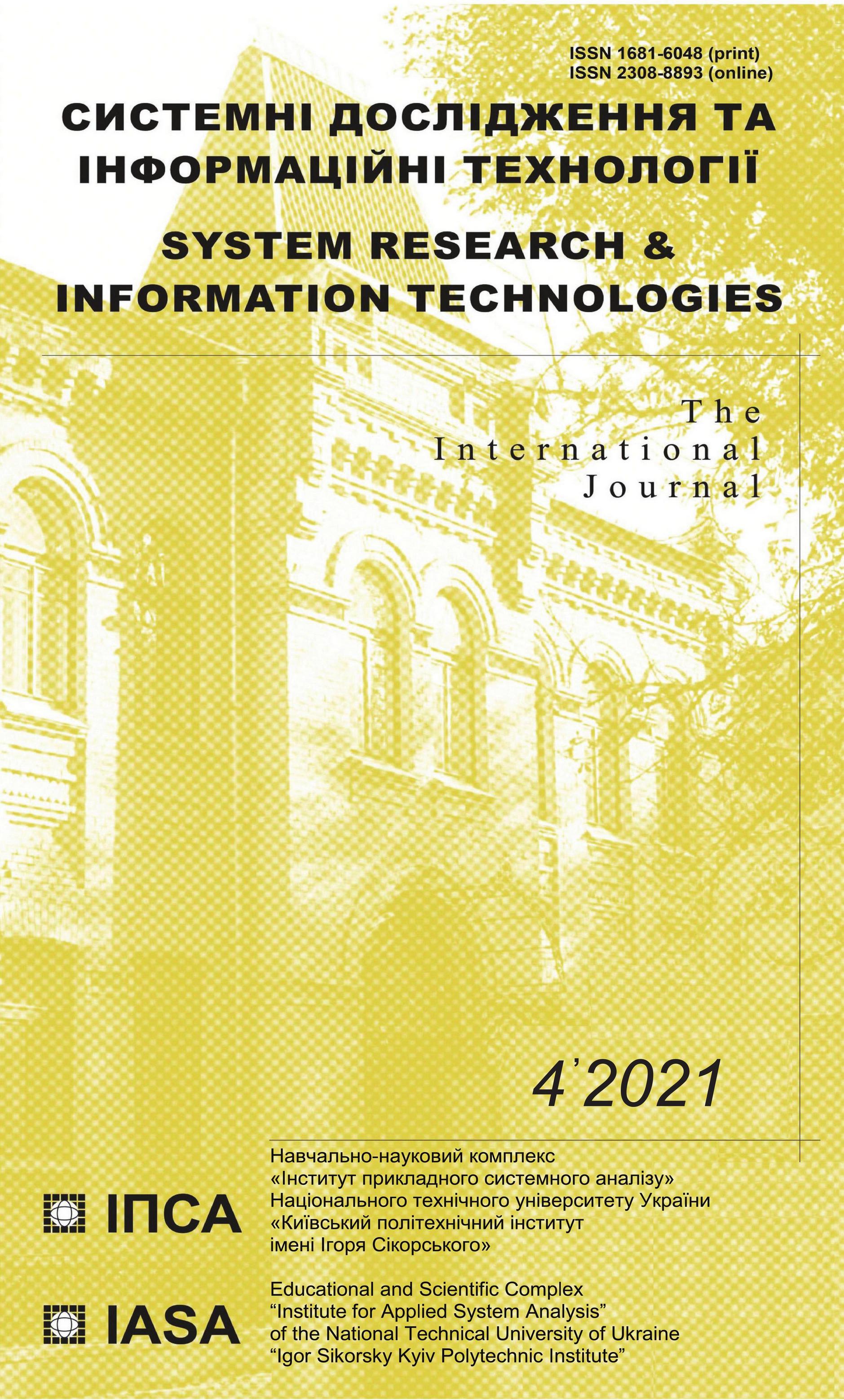Modeling of the intercivilization fault effect on the conflict intensity throughout the world
DOI:
https://doi.org/10.20535/SRIT.2308-8893.2021.4.01Keywords:
civilizations, clash of civilizations, conflicts, global threats, proliferation of weapons, multifactor regression analysis, fuzzy cluster methodAbstract
Using the mathematical apparatus of the multifactor regression analysis, the concept of faults between civilizations is verified, formalized and refined. The ethnocultural civilizational distribution of the countries is specified on the basis of the fuzzy cluster method. The mathematical model of fault lines between civilizations is elaborated, which affords the opportunity to estimate and analyze the quantitative values of these faults. Formally, the developed model offers the way to determine evolutionary regularities, systematize and econometrically verify the defining characteristics of actual civilizational clashes. The results of an analysis and comparison of modeling data of intercivilizational faults in 2008 and 2018 revealed the tendencies of individual civilizations to unite and clash, and the effect of these faults on the global conflict as well. The dependence of global threats on the proliferation of weapons and their individual components is assessed. The conflict effect on the socio-economic indicators of clashing civilizations is determined. The correspondence of the modeling outcomes to the real state of intercivilizational faults is verified by comparison with actual historical data. The results of the study encourage to form a comprehensive vision of the nature of modern clashes, whose emergence is caused by the faults between civilizations, and to determine their formal characteristics and regularities of their course.
References
S. Huntington, “The Clash of Civilizations?”, Foreign Affairs, 72(3), pp. 22–49, 1993.
S. Huntington, The Clash of Civilizations and the Remaking of World Order. New York: Simon & Schuster, 1996.
A. Toynbee, Civilization on trial. London: Oxford University Press, 1948.
N. Ferguson, Civilization: The West and the Rest. London: Penguin Press, 2011.
D. Kitsikis, La montée du national-bolchevisme dans les Balkans. Le retour à la Serbie de 1830. Paris: Avatar Editions, 2008.
C. Quigley, The Evolution of Civilizations: An Introduction to Historical Analysis. Mountain View: Ishi Press, 2014.
Der Briefwechsel zwischen Oswald Spengler und Wolfgang E. Groeger. Über russische Literatur, Zeitgeschichte und soziale Fragen. Hamburg: Helmut Buske Verlag, 1987.
Y. Harari, 21 lessons for the 21st century. New York: Random House, 2018.
E. Henderson and R. Tucker, “Clear and Present Strangers: The Clash of Civilizations and International Conflict”, International Studies Quarterly, no. 45, pp. 317–338, 2001.
J. Fox, “Paradigm Lost: Huntington’s Unfulfilled Clash of Civilizations Prediction into the 21st Century”, International Politics, no. 42, pp. 428–457, 2005.
A. Mungiu-Pippidi and D. Mindruta, “Was Huntington Right? Testing Cultural Legacies and the Civilization Border”, International Politics, no. 39(2), pp. 193–213, 2002.
M., Zgurovsky and M. Perestyuk, “Modeling of Clash of Civilizations in the Context of their Fundamental Cultural Differences”, Proceedings of the 20th International Scientific and Technical Conference “System Analysis and Information Technologies” (SAIT), p. 10. Kyiv: Igor Sikorsky Kyiv Polytechnic Institute, 2018 (in Ukrainian).
M. Zgurovsky and M. Perestyuk, “Systematic Research of Clash of Civilizations at the Beginning of the 21st Century”, Proceedings of the International Scientific Conference “Modern Problems of Mathematics and its application in Natural Sciences and Information Technologies, pp. 141–142. Chernivtsi: Yuri Fedkovych National University, 2018 (in Ukrainian).
M. Zgurovsky and N. Pankratova, System Analysis: Theory and Applications. Heidelberg: Springer Science & Business Media, 2007.
Conflict Barometer. Available: https://www.hiik.de/en/konfliktbarometer.
M. Zgurovsky and V. Yasinsky, “Revealing the Regularities of the Course of Systemic World Conflicts”, System Research and Information Technologies, no. 2, pp. 7–12, 2007.
UCDP Dataset Download Center. Available: https://ucdp.uu.se/downloads/ index.html#ged_global.
Ya. Chizhevsky, “Main Trends of Transformation of Nature and Character of Modern Political-Military Conflicts”, Military Thought, no. 6, pp. 7–22, 2020 (in Russian).
United Nations: Shaping our future together. Available: https://www.un.org/en/ un75/ new-era-conflict-and-violence.
T. Pettersson et al., “Organized Violence 1989–2020, with a Special Emphasis on Syria”, Journal of Peace Research, no. 58(4), pp. 1–18, 2021.
R. Sundberg and E. Melander, “Introducing the UCDP Georeferenced Event Dataset”, Journal of Peace Research, no. 50(4), pp. 523–532, 2013.
Global Analysis of Quality and Security of Life. In: Zgurovsky, M. (Scientific Supervisor of the Project) Sustainable Development Analysis: Global and Regional Contexts. Kyiv: Igor Sikorsky Kyiv Polytechnic Institute, 2019.
World Bank Open Data. Available: http://data.worldbank.org.
N. Skorobogatova, A. Kuharuk, and I. Pyshnograev, “Dynamic Analysis of Components of Economic and Innovative Development of the World”, Business Inform, no. 5, 26–33, 2017.
Nuclear Notebook. Available: https://thebulletin.org/nuclear-notebook-multimedia #skip-link.
Stockpiles of nuclear weapons around the world – in data, The Guardian, 11.03.2017. Available: https://www.theguardian.com/world/2017/mar/11/stockpiles-of-nuclear-weapons-around-the-world-in-data.
Our World in Data. Available: https://ourworldindata.org/nuclear-weapons/#data-sources.
World Uranium Mining Production, World Nuclear Association. Available: http://www.world-nuclear.org/information- library/nuclear-fuel-cycle/mining-of-uranium/world-uranium-mining-production.aspx.
Public spending on education. Available: https://data.oecd.org/eduresource/public-spending-on-education.htm.
Global Terrorism Index. Available: https://www.visionofhumanity.org/maps/global-terrorism-index.

